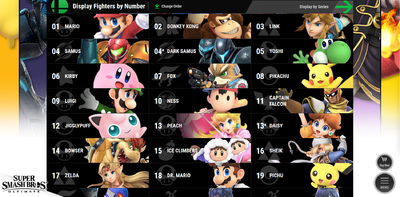Fighter numbers are a method of identifying and sorting characters in Super Smash Bros. Ultimate.
Definition
As explained by Masahiro Sakurai, the numbers order characters based on "the order in which they joined the series". They are ordered in the following way:
- SSB (01-12): The starter characters are ordered by their placement on the character selection screen, which in turn is based on each character's first appearance (with Mario and Donkey Kong as the oldest and Pikachu as the newest). The unlockable characters are similar, though they are sorted column-first rather than row-first as the starters are; as such, Ness precedes Captain Falcon despite being created later. This also matches their series debut order, explaining why Ness comes before Captain Falcon.
- Melee (13-26): The starter characters are ordered by their first appearance on Melee’s E3 2001 reveal trailer (based on which ones had their faces shown first, meaning that the Ice Climbers and Sheik come before Zelda, whose hand appeared earlier in the opening). Zelda was the only character on Melee’s starting roster who wasn’t revealed to be playable at E3 2001, which could also be the reason why Zelda is placed after Sheik, despite Melee treating her as the primary character and Sheik as an alternate form. The unlockable characters are ordered by how many Vs. Mode matches are required to unlock them, and thus Young Link, Ganondorf, Pichu, and Mewtwo's roles in the reveal trailer are ignored.
- Brawl (27-44): The characters first revealed in Brawl’s original trailer are ordered first, followed by the remaining newcomers in the order revealed on the official website. Notably, Pokémon Trainer is not given a fighter number, likely due to not being directly controlled by the player. Instead, the three Pokémon (Squirtle, Ivysaur, and Charizard, ordered by evolution stage) are given numbers instead.
- SSB4 (45-63) and Ultimate (64-81): The characters are ordered by when each newcomer was revealed.
- Echo Fighters share their number with their "parent" in addition to a superscript epsilon (ε), regardless of which game they joined in.
Usage
The Fighter numbers are used to order characters on Ultimate's character selection screen and promotional material. Mii Fighters are instead shown as the last characters on the selection screen, likely due to their customizable nature. The only major in-game usage of the fighter numbers is that Echo Fighters, due to not having their own fighter number, can be optionally stacked onto the character they are based on in the character selection screens for Vs. Mode, Special Smash (except for Smashdown), Tourney, and Online modes (except for Quickplay).
A similar system is used for ordering stages on Ultimate's selection screen, where all stages are ordered by when they first joined the series (with the exception of stages shared between both versions of Super Smash Bros. 4, which are mixed in with stages from exclusively Super Smash Bros. for Wii U).
Order
Trivia
- Coincidentally, Inkling's fighter number, 64, is the same as the number of the female Inkling’s costume in Super Mario Maker. The same also applies to Greninja, being number 50 in both cases.
- Had Echo Fighters been numbered normally (i.e. not grouped with their base fighters), they could be placed accordingly:
- Dark Pit may have been between Palutena and Pac-Man. Although he was officially revealed after the launch of Super Smash Bros. for Nintendo 3DS (which would place him between Shulk and Bowser Jr.), his status as a playable character was teased directly after the reveal of Palutena.
- Lucina would have been between Pac-Man and Robin.
- Daisy would have been between Inkling and Ridley.
- Richter’s position would have been unchanged, as he was revealed directly after his base fighter Simon and before Chrom making him the only Echo Fighter with this trait.
- Chrom and Dark Samus both would have been between Richter and King K. Rool, with Chrom listed before Dark Samus.
- Ken would have been between Isabelle and Incineroar.
- The starter characters in Melee, Brawl and SSB4's Sound Test are ordered in a similar way to the fighter numbers, except that Captain Falcon and Ness, Peach and Bowser (excluding SSB4), and Sheik and Zelda are swapped. In SSB4, unlockable characters are also ordered similarly (albeit they are separated from starters), but Lucina and Dark Pit are grouped together between Duck Hunt and Ryu. Sonic is also placed between Shulk and Ness.
- Oddly, on the back of the North American physical case of Ultimate, several characters are misplaced from their fighter number order:
- Luigi is between Jigglypuff and Peach, rather than between Pikachu and Ness.
- Zelda is between Young Link and Ganondorf, rather than between Sheik and Dr. Mario.
- Roy is between Pokémon Trainer and Diddy Kong, rather than between Mewtwo and Mr. Game & Watch.
- Ike is between Wii Fit Trainer and Rosalina & Luma, rather than between Snake and Pokémon Trainer.
- Toon Link is between Ken and Bayonetta, rather than between R.O.B. and Wolf.
- Palutena is between Ridley and Simon, rather than between the Mii Fighters and Pac-Man.
- Cloud is between Corrin and Simon, rather than between Ken and Corrin.
- Corrin is before Cloud, rather than after.
